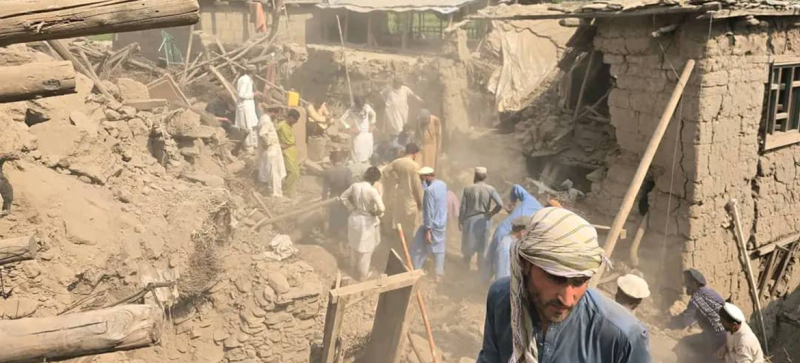- As debate over the location of climate conference razes on, will COP fail this time too? |
- UN Rights Office Warns of Gaza Escalation, West Bank Annexation |
- UN Warns Wildfires and Climate Change Worsen Air Quality |
- OIC Hails Belgian Declaration of Intent to Recognize Palestinian State |
- Bomb blast kills 15 near political rally in Pakistan |
Afghanistan Quake: Rescuers Reach Remote Villages on Foot

A massive assistance mission for earthquake survivors continued in Afghanistan on Wednesday as aid teams tackled blocked roads and downed communication lines to reach the most remote communities still in need of help.
Latest updates from UN assessment teams, who reached affected communities in the mountainous Ghazi Abad district on foot on Tuesday, underscored the urgent need to continue the humanitarian response.
“The issue of getting people out from under the rubble is urgent,” said Salam Al-Jabani from UNICEF in Kabul. “People are saying what is urgently needed is help to recover the dead and rescue survivors.”
Preliminary reports from Afghanistan’s de facto authorities indicate that at least 1,400 people were killed and more than 3,100 injured when a magnitude-6 earthquake struck northeastern regions late on Sunday.
Casualty figures are expected to rise further as search and rescue teams reach more areas, but some remote communities have yet to be accessed. Rockfalls and landslides triggered by the earthquake and recent heavy rains have made access difficult.
“Our teams had to leave their vehicles and walk two hours to reach Ghazi Abad,” explained Mr. Al-Jabani. “Other villages are six to seven hours away on foot and still not reached, not even by local authorities’ helicopters. Communications are patchy or non-existent: there is one cell tower near a health centre, otherwise it is dark,” he added.
The UN has dispatched at least 25 assessment teams to the affected region and increased humanitarian air service flights from Kabul.
UNHCR is deploying prepositioned essential relief items, including tents, blankets, and solar lamps, from stockpiles in Kabul. Immediate priority needs include emergency shelter, medical supplies, drinking water, and food assistance.
“Getting medicines in is very difficult… They are bringing essentials only on foot from the nearest UNICEF-supported hospital,” Mr. Al-Jabani noted.
Health care remains fragile, with medical staff at one damaged Ghazi Abad centre treating patients “outside, under trees,” as it is unsafe to stay inside.
Thousands of local community members are also helping the search and rescue effort, bringing water and food. “People in their thousands are moving in and out of the area,” the UNICEF official said.
While the focus is on helping survivors, funding shortages for humanitarian work in Afghanistan and beyond raise concerns that lifesaving relief may soon be curtailed.
“[The UN World Food Programme (WFP)] can only feed earthquake victims for a few more weeks before funding runs out. This is not long enough to meet their immediate needs or support rebuilding,” said John Aylieff, WFP’s top official in Kabul.
Of the $2.4 billion required to support aid and development programmes in Afghanistan this year, only $685.8 million has been provided by donors, according to the UN aid coordination office, OCHA.
Many Afghan women are among the first responders, “working up to 18 hours a day, travelling on foot to reach women and girls directly,” UN Women said.
“It’s exhausting work, and it’s impossible to reach everyone who needs help,” explained Susan Ferguson, UN Women Afghanistan Special Representative. The agency is working in quake-affected areas to assess needs and prioritize emergency cash assistance and distribution of essential items such as tarpaulins, soap, and feminine hygiene products.
“In a context like Afghanistan, it is essential that women deliver assistance to women and girls,” Ms. Ferguson noted, adding that in the 2023 Herat earthquake, nearly six out of ten fatalities were women, and nearly two-thirds of the injured were women.
“Cultural restrictions can make it harder for women to access support and services. Women humanitarians are vital to overcoming these barriers. Without them, too many women and girls would miss lifesaving assistance,” she stressed.

